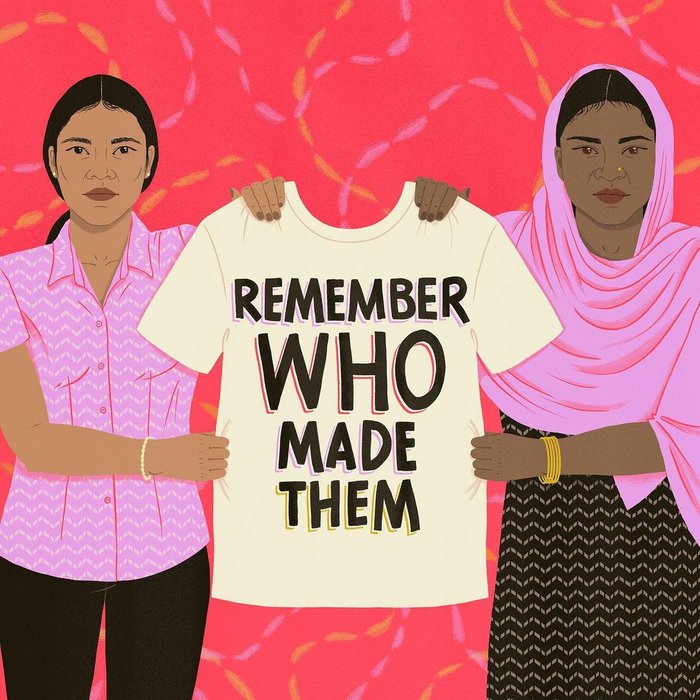The Titan Thread
The month in fashion, condensed.
Hi Hey there!,
In this quiet period between Christmas and the New Year, a lot of us (if we're lucky enough) are taking some time to rest, recover and reflect on 2020. Rather than looking back at *the year that was*, I thought I'd talk about something that we're all going to need a lot of going in 2021: optimism.
This year, the stories I've written have tended to be pretty grim, and sometimes I've found it hard to feel optimistic about the future of the industry. Whether I'm interviewing people who are on the front line of fighting for garment worker rights or trying to bring about legislative changes to regulate the industry, I always end on the same question: Do you feel hopeful for the future?
My favourite answer came from Nazma Akter, a Bangladeshi trade unionist who founded the AWAJ Foundation. She's been a key voice representing the garment industry workforce who have had to bear the brunt of cancelled orders this year and has seen first hand the catastrophic impact of the fashion system failing its most vulnerable workers. Nazma responded to my question by saying:
"Why do you think I’m working so hard? If we didn’t think things would change, why would we put in all this effort?"
If you noticed more ethical businesses emerging this year, saw your favourite brand adopting eco-friendly materials, or read a thought-provoking story that influenced the way you look at your wardrobe, you're witnessing optimism in action.
It's really exciting that sustainable fashion has reached a more mainstream audience this year. Now that more people are aware of the issues, becoming savvier to greenwashing and aware of the importance of transparency and accountability, it's time to drive the conversation into new and exciting territory in 2021.
There's a lot to be optimistic about, and I'm looking forward to what next year will bring.
Happy New Year!
Meg x
Stories I Wrote
How 2020 Became Carbon's Year of Reckoning for the Forward Lab. I noticed that carbon had been a topic that cropped up a lot in fashion this year. I was keen to understand why the industry honed in on the issue of carbon emissions in 2020, how far we've come in de-carbonising the industry and what it will take to get fashion's emissions in line with the Paris Agreement. I spoke with experts from leading carbon consultancies, as well as the founder of BEEN London, a brand that tracked the emissions of one of their bags and compared it to the emissions made by a high-street equivalent bag — the results were pretty astonishing.
Stories I didn’t write
These Trees are Not What They Seem by Ben Elgin for Bloomberg. Not strictly fashion-related, but a fascinating article I came across in my carbon research. Big corporations are buying meaningless carbon offsets by claiming to save forests that are already preserved. "By taking credit for saving well-protected land, these companies are reducing nowhere near the pollution that they claim," says Elgin.
How Toxic Masculinity Actively Opposes A Sustainable Future by Zach Thomas for The Good Trade. Ever noticed the lack of men speaking about sustainability? I sure have. Thomas writes that toxic masculinity has been a major contributor to the mess we're in and shares four actions to overcome it.
With Greater Diversity On Newsstands, Is Fashion Really Becoming A More Inclusive Space? by Chido Obasi for Grazia. Magazine covers may have become more diverse, but what about behind the scenes? That's where inclusivity and representation really counts, says Obasi.
Fashion Sluggish on Responsible Viscose, Report Says by Rachel Cernansky for Vogue Business. Viscose production contributes to deforestation and toxic waste pollution, but the industry doesn't seem to be making meaningful changes fast enough.
Inside the TikTok Trend Shaming Corporations for Destroying Perfectly Good Stuff by Darcy Jimenez for Mic. Hell hath no fury like a Millennial with TikTok and nothing to lose. That's how that saying goes, right?
Sustainability Must Mean Decolonization by Aditi Mayer for State of Fashion. Fashion's roots in colonialism continue to dictate the exploitative nature of the industry today, says Mayer. This piece is a valuable history lesson that sheds light on how the industry came to be, while also offering a roadmap to decolonization.
Covid-19 Gave Fashion The Chance To Change For The Better — But So Far, Results Are Mixed by Siena Capone for Fashionista. COVID-19 was a catalyst for reflection on our buying habits, but at the same time, fast-fashion profits grew exponentially. Has this year actually changed anything about the way we consume fashion?
Lily Cole: “Waste in Fashion Presents Not Just a Problem, But an Opportunity” by Harriet Davey for Stylist. There's so much more to Lily Cole than her career as a model — she's an incredible entrepreneur, sustainability advocate and author too. Loved this interview for Stylist.
Dressing for a Hotter Planet: In Lagos, Designers Look to the Past for Sustainable Fashion Solutions by Lovia Gyarkye for Vogue. Nigeria is facing the devastating impacts of the climate crisis, so its fashion designers are looking to the country's rich history for solutions.
I’m So Sick of Half-Arsed ‘Sustainable’ Fashion Lines by Maggie Zhou for Fashion Journal. "Without a dramatic overhaul of these brands’ business practices, the greenwashing tactics they employ are the equivalent of slapping a Band-Aid on a terminally ill patient," says Zhou.
It's Time to Stop Looking to Brands to Save Us by Whitney Bauck for Fashionista. We've put a lot of faith in brands to be beacons of morality in a time when trust for government, religion and traditional media is understandably low. This year, plenty of brands have failed to deliver what they promise. Bauck unpacks where it went wrong.
Gone Vintage: How To Build A Better Thrifting System by Emily Stochl for Atmos. With second-hand shopping on the rise, we've lost sight of why charity shops exist in the first place. So what does their growing popularity mean for the people who actually need their services? Stochl has some interesting solutions.
Report Warns Sustainable Fashion May Take a Backseat in Pandemic Recovery by Liz Warren for Sourcing Journal. "Globaldata warns that sustainable fashion could become a 'COVID-19 casualty' as companies scramble to stay afloat." GREEEEAAAAAT.
The To-Do List
I got to interview the amazing journalist Elizabeth Cline earlier this year and her Atmos article, Twilight of the Ethical Consumer, made waves in October for being a thoughtful and honest reflection on the true value and impact of ethical consumerism. Cline went on the Remember Who Made Them podcast to discuss her story and sustainability journey.
850,000 gold rings could be made from recycling unwanted electronics in the UK alone. Isn't that mad? This month, NGO Recycle Your Electricals has partnered with jeweller Lylie's on a collection of rings made from electronic waste metals. It's backed by Lily Cole, and is encouraging us to recycle our worn-out tech so it can be given new life as beautiful ethical jewellery.
Terra Neutra has a really interesting product range, selling carbon offsetting packages for specific lifestyle choices like flying or owning a pet. The aim is to help consumers understand the carbon cost of our lives. This year, they're offering Christmas offsets for £8, which goes towards projects like rainforest conservation in Madagascar.
Not a "new" recommendation but it occurred to me that not everyone knows about Good on You, probably the most useful sustainable fashion app out there. I use it all the time — just type the brand you're thinking about into Good On You's search engine and it'll give the brand a rating based on their publically available sustainability information.




